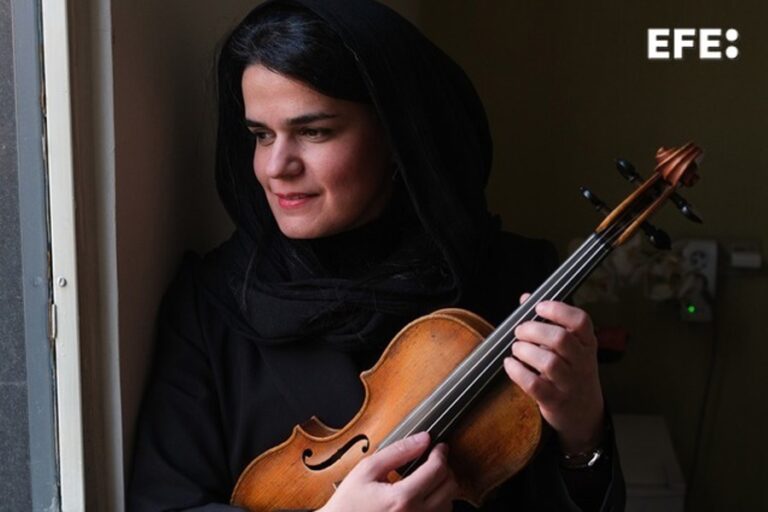
Tehran’s trailblazer dreams of women singing freely
Tehran, (EFE).
Paniz Faryoussefi, who made history last week as the first woman to conduct the Tehran Symphony Orchestra, says she hopes her achievement helps advance another long-held dream: that Iranian women be allowed to sing freely in the conservative Islamic republic.
“One of my dreams is that women can sing freely in Iran,” the 42-year-old violinist and conductor told EFE.
“I have always believed that music has no gender. There is no difference between a man and a woman who sings,” she said at her family’s music school, decorated with trophies, a bust of Beethoven and shelves of music theory books.

In Iran, women may sing only before an all-female audience, a restriction in place since the early 2000s, and they are banned from recording albums.
In some cities, including Isfahan and the religious center of Mashhad, women are not even allowed to play instruments publicly in an orchestra, she said.
Faryoussefi broke one of those barriers last week when she conducted two concerts with the Tehran Symphony Orchestra at the Vahdat Auditorium before an audience of both men and women.

“I felt a great responsibility, technically and socially, because it is not common for a woman to conduct an orchestra in Iran,” she told EFE.
“I truly believe I had the determination, courage and bravery to fulfill my dream of conducting such a large orchestra.”
She hopes her presence on the podium will encourage other girls and women, just as she was inspired two decades ago when she attended a private, industry-only concert conducted by Iranian-Austrian maestro Nazanin Aghakhani with the same orchestra.

Aghakhani, however, was not allowed to conduct publicly.
Until that moment, Faryoussefi had thought it was “impossible” for a woman to lead an orchestra in Iran.
The first woman to conduct a public concert in the country was Nezhat Amiri in 2018, with the National Orchestra of Iran.
The daughter of musicians, Faryoussefi began playing violin at age 12, joined the symphony orchestra as a violinist at 18, and trained in Armenia between 2002 and 2007.

Two years ago she began conducting the private ‘Dialogue’ orchestra, which she said opened the door to the Tehran Symphony. “Many people realized that a woman can conduct.”
The two concerts she led last week were dedicated to her mother and to Iranian women.
Alongside works by Schubert, Sibelius and Khachaturian, the program included pieces by Iranian composers Golfam Khayam and Aftab Darvishi.

Women’s freedoms in Iran
Women’s rights in Iran have drawn renewed global attention since the 2022 death of Mahsa Amini, who died in police custody after being detained for allegedly wearing her headscarf improperly.
Her death sparked nationwide protests calling for the end of the Islamic Republic under the slogan “woman, life, freedom.”
The reverberations continue today. Many Iranian women still appear in public without a veil in acts of civil disobedience.

The reformist government of President Masud Pezeshkian has eased restrictions on women and cultural activities, visible on the streets of Tehran, where women appear uncovered and street musicians sometimes perform songs by Western bands such as The White Stripes.
These signs of loosening controls have drawn criticism from conservatives who demand that the emerging freedoms be curbed.





